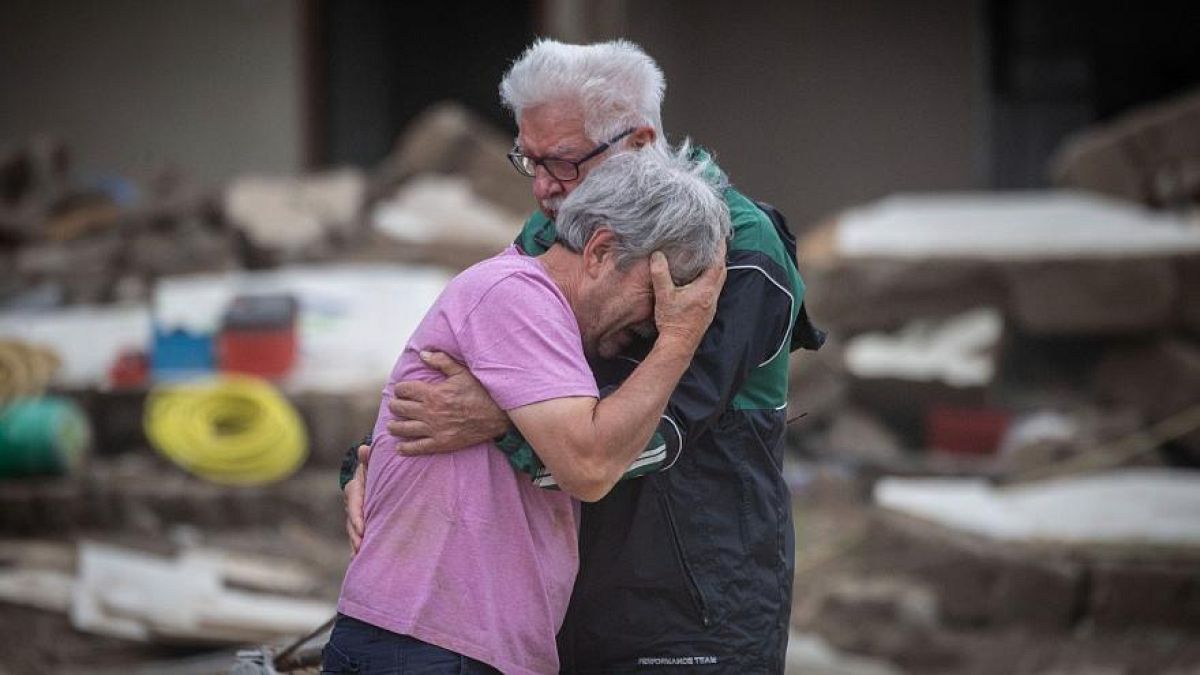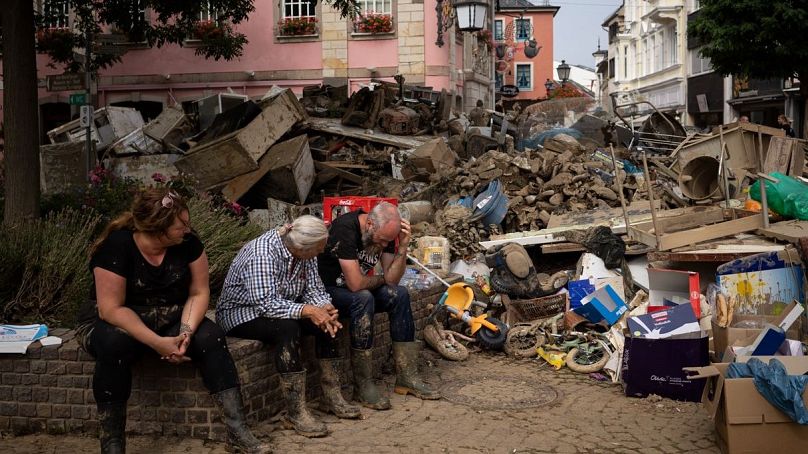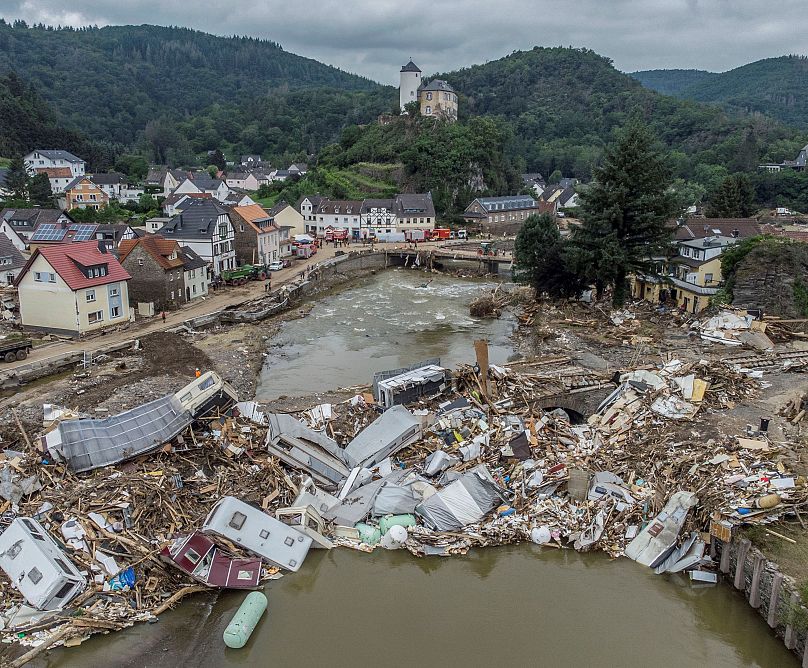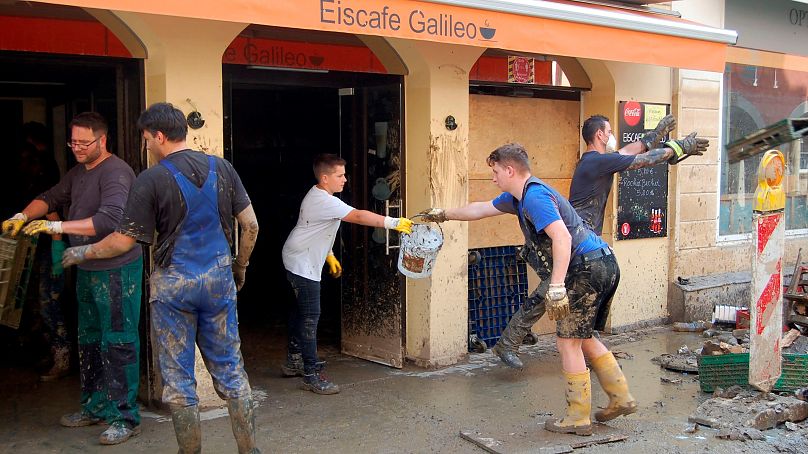Of the 180 people that died in Germany amid record flooding in July, 133 were neighbours of the Ahr Valley.
“My father, my grandfather...all my family... we were born, worked and lived here. This is the situation of most of the people of this area.”
Gerd Baltes, a 69-year-old German, explains his deep roots to his home town, Mayschoß, in the Ahr Valley in the west of Germany.
It’s one of the areas most affected by the flooding that hit in July, flooding that has destroyed swathes of Germany near the borders with Belgium and the Netherlands.
A retired police officer, these days Baltes works in a crisis team, helping his neighbours to rescue their homes from the destruction that was left in the wake of what is known in Germany as the "flood of the century".
Of the 180 people that died in the country amid record flooding, 133 were neighbours of this wine-growing valley near the cities of Bonn and Cologne, a tourist destination that is crossed by a tributary of the Rhine river.
“This valley is basically the middle-class dream,” explains Wilhem Schulz, whose family lives in the valley, in the district of Ahrweiler.
“There are many people with enough money to retire here debt-free in the houses they built for themselves.”
But that was before what happened on July 15. “Now everything is destroyed,” says Schulz, recounting the damage to hotels, restaurants, and all types of infrastructure and services that made life possible in the valley.
The cost of the damage is estimated at more than €3.7 million.
When the water started to rise, Schulz was trapped for the night in his sister’s house.
From there he watched the water surround them, making the walls shake, with cars floating off and trees falling in front of the windows.
They were not prepared for this type of situation, nor were they rescued.
“We waited until four in the afternoon the next day without seeing or hearing anything,” he recalls. “Nobody told us the flood would be so bad. Nobody told us about a rescue plan.”
Like Schulz, the flooding caught the rest of the neighbourhood unawares.
The public prosecutor's office has filed a lawsuit against the local authorities in Ahrweiler for negligent homicide after 12 disabled people drowned in a residence in the town of Sinzig.
They are accused of failing to warn of danger and evacuate.
The unpredictable nature of the effects of climate change, according to Fred Hattermann, a researcher at the Potsdam Institute for Climate Impact Research (PIK), is causing cases like this where forecasting rainfall levels is difficult.
“The number of extreme phenomena is growing,” he says.
“A warmer atmosphere has more capacity to absorb water, to hold it, to transport it around the central, south and north of Europe, and there is then more possibility of rainfall being more frequent and intense.”
Furthermore, previous rains had weakened the soil’s capacity to absorb more water.
“It rained for practically two days without stopping,” recalls Karsten Haustein, a scientist and meteorologist at the Climate Service Centre Germany.
“Now imagine a valley like the Ahr, where water cannot flow out.”
'How are you going to know about these risks if no one has told you about them?'
A study published by the international group of climate scientists from the World Weather Attribution (WWA) in August concluded that climate change was a critical factor in the flooding.
Haustein explains that its role in increasing rainfall by between 19% and 30% has been scientifically proven.
“These floods have shown us that even developed countries are not safe from the impacts of extreme climate that we have seen and that will get worse as the climate changes,” wrote Friederike Otto, a climatologist at the Environmental Change Institute at the University of Oxford, and co-author of the study.
Another theme to be highlighted by the flooding in the Ahr Valley is construction in areas at high risk of flooding.
“We always think that it cannot happen here, and therefore this is the result”, argues Haustein. “
However, the scientist doesn’t believe the responsibility lies with the citizens, but instead with the authorities.
“In the past, they said that if you lived in the valley of a river, you had to be aware of the risks, but, to be honest with you, if you don’t understand meteorology, climate, or science, how are you going to know what these risks are if nobody has told you?”
“If even the people that sell you the house or permit you to build your house there don’t tell you? How are you supposed to have known?”
“Therefore we cannot blame the people, but it is those that take the decisions, that plan, because they had to know. They have to know it's their responsibility.”
This is also where private insurance comes into play, as it is playing a key role with the advance of climate change.
In some regions of Germany with high risk of flooding, like Bavaria, where, in 2019, a new law established that the government would not give financial assistance to those homes that were not insured, except for under exceptional circumstances.
This still isn’t the case in the Ahr Valley, where Baltes estimates the majority of his neighbours have not insured their properties: “You need special insurance. You need two insurances. One, housing insurance, then another for everything inside. I would say that 80% of the people here don’t have it.”
‘I know lots of people that don’t want to return’
The flooding surprised Germany’s political life, in the middle of an election campaign.
The government has promised €30 billion for reconstruction, but the oldest inhabitants worry they won’t live to see their communities return to how they were before the flood.
This is the case with Wilhem Schulz’s uncle and grandmother. They don’t want to spend their last years worrying about the reconstruction of their homes in a zone with devastated infrastructure.
“My grandmother lived in the city centre and her apartment was quite elevated,” explains Schulz. “It wasn’t destroyed, but everything around it is devastated. All the shops, the restaurants, everything that made the valley habitable for someone like her, who is older.”
Schulz believes that, “being realistic”, it will take at least a year for the place to recover.
The other group of people that don’t want to return to the valley are those who were too traumatised by the crisis. The authorities have provided the support of a psychologist for the inhabitants, but, for many, to know that their neighbours died trapped by water in houses near to them, has left too strong an impact.
“I know of many people who don’t want to return,” said Schulz. “Their stories are very traumatic. People who have seen their neighbour’s house taken by the current, and nothing has changed, no reconstruction is underway.”
Baltes is also sadly aware that between 5% and 10% of the inhabitants will leave the community forever.
“A town needs inhabitants. We don’t want to live in a ghost town. And there is the danger that if we cannot put in place the measures necessary for winter, the people will abandon our town,” says Baltes.
Asked if the people of the Ahr Valley have become climate migrants, Baltes points to their deep roots to the area, going back generations.
But he knows that if the climate stays unpredictable, with more rain and more danger, this is a possibility.
“But where will they go?” he asks. “Where can you be safe from climate change?”
Every weekday, Uncovering Europe brings you a European story that goes beyond the headlines. Download the Euronews app to get a daily alert for this and other breaking news notifications. It's available on Apple and Android devices.



